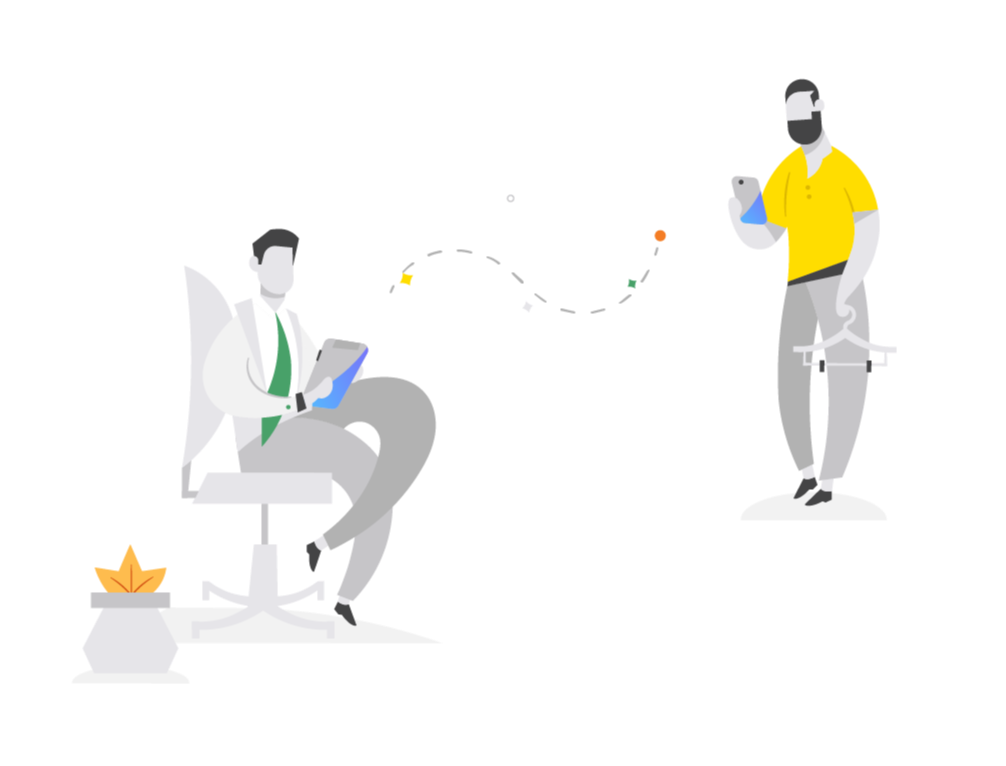Conversion rate: An unengaged employee won’t go the extra mile to encourage browsers to become buyers, or to increase a customer’s basket size.
Employee engagement. Just another corporate buzzword, right? Think again.
Engaged employees are the key to an impeccable customer experience. And for businesses with physical locations, customer experience is everything.
The role of the store associate has changed dramatically over the years. In the golden age of department stores, customer experience used to be of the utmost importance; then, over time, the interaction between employee and customer became more of an impersonal, transactional one.
That all changed again with the rise of online shopping. Now, the main advantage that brick-and-mortar retailers still have over their e-rivals is the humble store associate.
A smiling face behind the counter, a helping hand when you need advice. Someone that will go the extra mile to make sure you get what you need out of your shopping experience.
The power of a personalized, human experience cannot be underestimated after the isolation many have experienced during the pandemic. A study by Redpoint global found that 77% of consumers believe that positive customer experience still requires human interaction. Additionally, consumers will consistently pay more for a product or service when they experience great customer service.
Unfortunately, the stress of working in retail means that it can be difficult for employees to put on that smiling face and stay engaged in their work. A survey of 1,000 frontline employees found that 34% of employees feel disconnected from their company and over a quarter of Millennial employees don't feel empowered in their jobs. Not only this, but 41% of retail employees hardly ever look forward to going to work.
This lack of engagement has very real consequences - unengaged employees cost the global economy $7 trillion every year.
This guide will show you exactly why employee engagement is so important, and how you can make sure staff across your entire network are engaged, happy and always ready to go above and beyond for your customers.
First things first - let’s define what employee engagement is actually all about.
Management consulting firm Aon Hewitt asserts that engaged employees:
To work in retail, you have to enjoy interacting with other people, providing help and advice, and pretty much just making each customer’s day a little brighter.
So it follows that an engaged store associate should:
But even for the most sociable, upbeat employee in the world, at times working in retail can really… well, suck. And that can lead to them becoming unengaged in their work.
Here are just a few of the problems that can arise from an unengaged workforce:

Conversion rate: An unengaged employee won’t go the extra mile to encourage browsers to become buyers, or to increase a customer’s basket size.
Store compliance: Flawless execution of visual merchandising guidelines and health and safety procedures are essential to creating a flawless customer experience. But if employees aren’t invested in upholding safety brand standards, they won’t take care to implement those guidelines correctly.
Employee turnover: Average employee turnover for all U.S. industries is around 19%. For retail, it's over 60%. This means lots of time is spend hiring and the competition is tough when it comes to attracting the top talent. Turnover costs businesses a lot of money - both in hard costs, such as hiring and training expenses, and soft costs, like the loss of knowledge and skills.
Customer experience: A disinterested, uninformed or downright rude employee will inevitably lose sales. Not only will the customer leave the store without buying anything, but they’ll also tell others about their bad experience. According to ReviewTrackers, 94% of consumers surveyed said they had been convinced to avoid a business based on negative online reviews.

Profit: Research by Gallup has demonstrated that engaged employees make 18% more sales and demonstrate 23% higher profitability. Engaged employees make more money - simple as that, really.
Employees don’t become disengaged without reason. And if you really want to cultivate a professional environment where your teams feel engaged with their work and ready to perform their best, you have to pinpoint those causes and figure out how to remedy them.
If you’re noticing a lack of engagement in your teams, here are some questions you might want to ask yourself:
Because of high employee turnover, retailers often don’t put enough effort into creating a positive experience for their staff - which makes employees wonder why they should bother contributing more than the bare minimum.
However, the competition is intense when it comes to hiring the right talent and having engaged, fulfilled employees improves the reputation of a retailer with job seekers.

Implementing technology to make life easier for your teams, and creating tailored training programs to support their development, will show employees that you want them to feel fulfilled and happy at work.
Related: [Infographic] What Do Frontline Retail Employees Want in 2021?

Even in the social media age, businesses often have trouble communicating between different tiers of their organization, because the way they communicate is stuck in the past.
Because most retail workers are deskless, mobile technology is needed to make sure messages are disseminated properly to all employees. Employees that feel like they’re in the loop will stay engaged with company updates.
Related: 5 Common Problems with Retail Communications and How to Fix Them
Communication between regional managers and on-site employees can be strained, as they don’t see each other often enough to form a close working relationship.
That’s why the time that regional managers do spend on-site - usually to carry out audits - should be spent wisely, giving help and advice to teams rather than simply filling out checklists.


Store associates are what give physical retail an advantage over online, and their contribution should not be underestimated.
A McKinsey survey found that consumers consider helpful and knowledgeable staff to be a top-three feature when shopping in store.
However, retail staff often feel underappreciated or unseen despite their indispensable work, so reminding them of their value will help keep up morale.
Related: Gen Z and Millennial Frontline Employees Feel Unfulfilled: Here’s How to Fix It
Regardless of what industry they’re in, people want to feel like their work has meaning. Properly communicating your business’ core philosophy and mission statement to employees will help promote a sense of team spirit and keep them focused on a common goal.


With turnover rate in retail now at over 60%, it’s very easy to dismiss employee engagement concerns with a “well they’re just going to leave anyway” kind of attitude.
All this does is make existing employees feel like they don’t matter, and put potential employees off applying.
If you show your staff that hard work will be recognized, they might just stick around long enough to prove that making an effort to engage employees is worth it.
Offering employees a little something extra as a reward for their hard work - be it a bonus, an after-work pizza party, or the chance at a promotion - is a great way to drive engagement, and will also boost your reputation as an employer.

When it comes down to it, employee engagement really isn’t rocket science. If you put more effort into creating a positive and nurturing work environment, your teams will respond well to it. Here are 3 ways you can do that:
Related: Why You Should Invest in Driving Frontline Employee Engagement
#1 - Give store associates the tools they need to spend more time with customers
Sales associates can’t create the perfect customer experience if they’re spending most of their day dealing with low-value admin tasks. Streamlining store operations with mobile technology will improve not only customer experience, but employee engagement, too. Here’s how:

#2 - Rethink training
Training is what keeps things running smoothly. It’s what helps store associates become the knowledgeable, friendly and helpful experts who make a shopping trip infinitely better. And yet, whatever training retail employees receive doesn’t seem to be working.

In our 2021 survey, 40% of frontline employees reported being trained only once a year or less.
Here are the changes every retailer needs to make to their training:
#3 - Motivate with meaning
Engaged employees are motivated to go above and beyond - but retailers are missing out because they’re not providing their staff with the motivation in the first place.

If store employees don’t see the value of what they’re doing every day, customers won’t either. The work they do is indispensable - it’s up to the retailer to motivate teams by reminding them of that fact! Here’s how to go about it:
Related: 7 Surprising Employee Engagement Metrics to Track for Frontline Employees
Before anything else can happen, first you have to figure out why your employees should be engaged in the first place.
Too often, the main question in the hiring process is what the prospective employee will bring to the table. But this is a two-way street - it’s just as much about what the employer can do for them.
So why, exactly, should employees actually want to work for you? What are you offering them?
If you can’t answer that question, there’s work to be done.
All the technology and training in the world can’t engage your employees if there’s nothing behind it.
Once you’ve determined what your value is as an employer, you can work on providing that value by making employee engagement a priority.
Employee engagement (or rather, a lack thereof) is one of the biggest challenges facing retail today.
Retailers would be nothing without the hard work of their staff, but if they’re given very little in return, they’ll go elsewhere. And even if they don’t, shoppers will sense their disinterest and they’ll shop elsewhere.
But it’s really not a difficult problem to solve. To ensure your staff actually enjoy their jobs, you should:



Engaged employees are a brand’s greatest asset. Nurture them, and you’ll see a dramatic change in the quality of customer experience.
YOOBIC is an all-in-one Frontline Employee Experience Platform that gives employees everything they need to be at their most productive, knowledgeable and engaged, right in the palms of their hands.
See for yourself why over 350 brands and retailers around the world including Lacoste, Boots, The Kooples, Peloton and Gamestop use YOOBIC to engage their frontline teams!